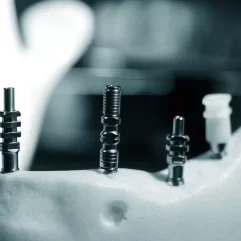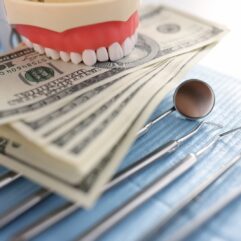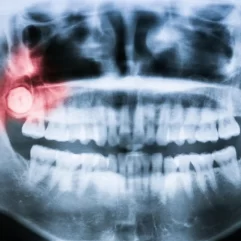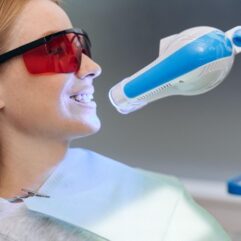Snap-in Dentures: Are They Right for You?
More and more people are looking for alternatives to address missing teeth; dental implants, all-on-4s, and snap-in dentures, also called overdentures, are getting much attention and interest. As a result, we receive more requests for information about these procedures than any other inquiry.
Our website has a lot of information about dental implants and all-on-4s, but what are snap-in dentures and their advantages and disadvantages?
What are Snap-in Dentures?
Snap-in dentures, also called “overdentures” and “implant-retained dentures,” are removable tooth restoration solutions that are more stable than traditional dentures but not as sophisticated as the All-on-4 procedure (non-removable permanent dentures). They are a cross between conventional dentures and implants.
Snap-in dentures can be complete or partial, and in either case, the denture appliance is mounted on implants inserted into the jawbone. Typically, there are fewer implants used than with an all-on-4 procedure. In addition, the row of teeth in the form of dentures “snaps” into the rods. As such, the appliance is more stable than traditional dentures.
What are the Pros and Cons of Snap-in Dentures?
Since smaller (often fewer) implants are used, snap-on dentures are usually faster to complete and less expensive than permanent implant solutions. So, they are more affordable than the all-on-4 (non-removable permanent dentures) procedure. In addition, you may be able to get snap-in dentures even if you have some bone loss since the mini-implants require less bone mass. This could avoid the additional procedures of bone grafting or sinus lifting.
Traditional dentures are cheaper and can be produced more quickly than snap-in dentures, but they do not last as long and require more maintenance. They are also less stable than snap-in dentures. However, snap-in dentures, while being more costly (and taking more time to complete), are more comfortable, stable, and durable—snap-in dentures typically last five years or more.
It’s important to note that the false teeth must be removed each night for cleaning with either traditional dentures or snap-in dentures. This is not the case for all-on-4s, which are considered a permanent solution (although they wear out over a longer time), but all-on-4s are considerably more expensive. That said, our trained and experienced dental professionals in Mexico can provide any of these procedures, typically at 50% or more savings over average US prices. Again, the savings are significant in Mexico compared to the US (up to $120,000.00 for all-on-4s, by some estimates).
While snap-in dentures are a step beyond traditional dentures and are more affordable than all-on-4s, they have drawbacks to remember. First, they need to be removed nightly, just like conventional dentures, and reports from our clients and our Implantologist professionals say that this system is prone to failure.
It isn’t as reliable as a more permanent solution such as all-on-4s. There are ongoing maintenance expenses, and the prosthesis’s life is limited compared to a more permanent solution. They do not absorb all the shock from contact with food, may require a softer diet, and need realignment occasionally. Still, if cost is an issue that precludes a more permanent solution such as all-on-4s, snap-in dentures can have significant advantages compared to traditional dentures.
Pros of Snap-in Dentures
- Restore the natural look of your teeth
- More stable and easier to speak with than conventional dentures
- Affordable implant-supported denture solution
- It can be effective at disguising lost gum in an attractive way
- Will not slip out when you eat, drink, or sneeze
- Do not trigger the gag reflex
- It helps maintain bone mass and prevent loss
Cons of Snap-in Dentures
- Daily maintenance is a must; they need to be taken out, cleaned, and stored
- Suitable bone support is necessary
- Dental insurance may not pay for this procedure
- Requires a surgical procedure to place
- The entire process typically takes 4 to 6 months
- The lifetime usually lasts between five and ten years
Who is a Candidate for Snap-in Dentures?
There are several considerations with snap-in dentures. Smoking is a big challenge to implants in general and is often the cause of the system’s failure. It is highly recommended that snap-in dentures be fitted for non-smokers only. It’s also not a suitable solution for TMJ, gum, or periodontal disease. TMJ patients usually do best keeping their teeth in at night.
Periodontal disease must be absent before implantation begins, or you may risk further dental infections. And as mentioned earlier, hard foods must be temporarily void in your diet. If you want to consume steak and similar foods, you may not be happy with snap-in dentures, as recommended in a soft-food diet.
Most importantly, any implant procedure requires good oral health. A doctor specializing in implants can review your dental history to assess if snap-in dentures are your best option.
What are the Steps Involved in Getting Snap-in Dentures?
Here are the basic steps in the process of getting fitted for snap-in dentures:
- Start with a consultation. Our patient care professionals will review and discuss your case with our certified, experienced implantologist.
- The dental office can help develop a dental treatment plan for you.
- If needed, extractions are completed, bone grafting will be performed to give you the volume of bone structure required to receive the implant rods, and then a period of months (three to six months) for healing is needed. Temporary dentures are provided during the healing phase until the next phase of the procedure.
- On the next visit, permanent fixed hybrid dentures are placed, and depending on the individual case, a follow-up visit may be necessary for final adjustments.
Note: The fees our clinics charge include the surgical placement of standard implants, temporary dentures, abutments, healing caps, permanent fixed hybrid dentures, and follow-up appointments.
It’s a lot to think about and absorb. But Beyond Borders Dental is here to help you choose the best solution.
If you have questions or need additional information, please Contact Us or Request a Quote to send us your dental inquiry, and we’ll get back to you.











